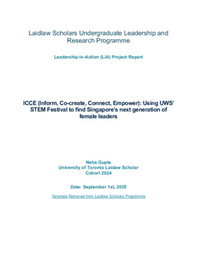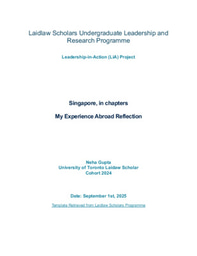This post is part of a series of reflecting on the weekly chapters of my LiA experience in Singapore.
My first week in Singapore was very touristy – I was with my parents for that first week and together we tried to see all the glitzy tourist attractions we could. I had watched all the “What to do in Singapore” YouTube videos I had time for, so seeing things like Marina Bay Sands and the Supergrove Trees for myself felt oddly familiar. I spent that entire week trying to convince myself that I was someone who could live on my own in this country. I pressured myself to never let new things about Singapore faze me, and get used to everything about my surroundings within that first week. And surrounded by my parents, I felt I could do anything needed of me. I didn’t have to think about what resources I was being provided or the more basic needs I had, I had the privilege of needing to take action on the “wants” I had.
On my parents’ last night in Singapore, we ate at a restaurant at the top of Marina Bay Sands to celebrate my birthday. As I gazed out of the window, I was amazed that I’d conquered Singapore within a week. I felt as if the ability to physically look down on the country meant I’d come to understand it already or was privileged enough to get a bird-eye view of the city-state. That feeling of amazement was quickly replaced with shame, because I knew I had come to Singapore cushioned by support (namely that of my parents). I’d never be having this experience if I wasn’t so well-supported. (Little did I know, wrestling with my privilege would become the theme of my entire stay.) My parents helped me move into what would be my home for the next three months. Everything about it presented a vastly different way of life than what I was used to, but it was home because it had to be.
My second week started off with my parents leaving the country. Saying goodbye to them and walking back to my room, I was numb with adrenaline and an urge to live “perfectly” from that moment out. I also started an internship with Pro Bono Singapore, a legal clinic that connected low-income Singaporeans with legal challenges to lawyers who’d provide free legal advice. I soaked up every moment of that internship that I could, including my fellow interns’ backgrounds and insights, my supervisors, the lawyers’ demeanour and attitude. The internship was very emotionally heavy; it tested my ability to be rational and realistic in the face of need. Picking up phone-calls and reading stories of trickery, bad luck and loss exposed me to what “reality” can look like. After a draining Winter term exam season, it was refreshing to feel my zeal of learning organically coming back to me. The internship helped take my mind off of the pressure I was putting on myself to rapidly adjust to Singapore. It didn’t help that after sharing with others about the neighbourhood I was staying in, I learned it was known as the “slum” of Singapore. I realized that if I chose to give weight to this characterization, I’d be giving myself a reason to never try to find beauty in my neighbourhood or try to make it feel more home-like. So I did my best to put it behind me.
Aside from the neighbourhood, Singapore gave me my first taste of things like co-living and housemates, unfamiliar cuisine and foods, language barriers and community-driven culture. I found it challenging to be trying to live the way I was used to when it seemed every stimulus input I received around me was incompatible with how I lived. The grocery stores didn’t have things I recognized, people had trouble understanding me when I spoke, my housemates cooked very different foods and had foreign communal mannerisms. These differences tested my sense of identity but also my ability to be flexible and adapt to new situations. I took myself to visit more touristy places in my second week, which was very formative. There was something poetic and fate-driven about each of the places I went to see; I took many pictures as I tried to slow my racing, itinerary-driven mind.
My third and fourth weeks saw me fall into a rhythm. Small joys included trying exotic snacks at Pro Bono SG’s office, biking across the Helix Bridge at sunset and discovering that I could cook Indian food (my first dish was tehari in a pressure cooker – I was shocked that the salt level wasn’t unpleasant because I’ve realized what a fickle friend salt is).


Please sign in
If you are a registered user on Laidlaw Scholars Network, please sign in